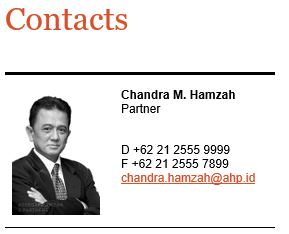New Regulation on Customs Recordation
Introduction
On 30 May 2017, the President of the Republic of Indonesia enacted Government Regulation No. 20 of 2017 on the Control of Import and Export of Goods Allegedly Constituting or Deriving from Intellectual Property Infringement (“GR No. 20/2017“). GR No. 20/2017 is essentially the implementing regulation of Law No. 10 of 1995 on Customs as amended by Law No. 17 of 2006 (“Customs Law“).
GR No. 20/2017 contains a more comprehensive mechanism in dealing with the flow of imported and exported goods allegedly infringing the intellectual property right by the Directorate General of Customs and Excise (“Customs Office“). This mechanism is aimed to provide preventive-type of measures as well as procedures for the officers of Customs Office (“Customs Officers“) in handling any suspected counterfeit goods shipped into or outside Indonesia by way of identification and verification against information on any relevant trademarks and/or copyrights recorded in their recordation database.
Below are the highlights of GR No. 20/2017:
Recordation System
Under GR No.20/2017, the owner or the right holder of trademarks and/or copyrights can file for recordation with the Customs Office. The requirements for filing the application for the recordation are as follows:
- Evidence of trademark and/or ownership;
- Information on the characteristics of the originality of products and/or the specification of copyrighted products; and
- Statement from the owner or right holder with respect to any consequences arising from the recordation.
The Customs Office will issue an approval or rejection letter to such application within 30 days upon receipt of such application. If it is approved, the trademark and/or copyright recordation will be valid for one year and is extendable.
Preventive Measure by the Customs Office
As a consequence of trademark and/or copyright recordation at the Customs Office, the Customs Officers should now be able to exercise their powers on their own initiative to take a preventive measure with respect to any import and export of goods suspected of infringing a certain intellectual property right. The preventive measure taken is, essentially, to notify the owner or right holder recorded in the Customs recordation database of any suspected counterfeit goods being shipped into or outside Indonesia together with sufficient evidence thereof if the Customs Officers identify such potential illegal activities.
Upon receipt of such notice, the relevant owner and/or right holder must give their response confirming their intention to seek for a suspension order (“Confirmation“) to the Commercial Court. Such response must be sent within two days as of the date of notice given by the Customs Office.
If the relevant owner and/or right holder opts to file a petition for a suspension order (“Suspension Order“), they must file it within four business days as of the delivery of Confirmation to the competent Commercial Court and pay bond in the amount of Rp. 100 million to the Customs Office.
Enforcement of the Suspension Order by the Customs Office
In addition to the preventive measure as mentioned above, GR No. 20/2017 sets out the mechanism for the Customs Office to exercise its powers in relation to the enforcement of Suspension Order issued by the Commercial Court.
If the Commercial Court issues the Suspension Order, which is to be rendered within two business days as of the filing date, the Customs Office should enforce such Suspension Order at the latest within ten business days as of the receipt of the Suspension Order, which can be extended for another ten business days. In enforcing the Suspension Order, the Customs Officers will (i) send the notice of Suspension Order to the exporter, importer or the owner of goods, the owner or right holder of the recorded trademark and/or copyright and the Directorate General of Intellectual Property (“DGIP“) and (ii) hold a physical examination upon suspected counterfeit goods according to the specified schedule as proposed earlier by the recorded trademark and/or copyright owner or right holder. In examining the suspected counterfeit goods, the Customs Officers will be accompanied by the recorded trademark and/or copyright owner or right holder, the representative of the Court and the representative of the DGIP, with or without the presence of the exporter, importer or the owner of goods.
Suspension Termination
The Customs Office is required to terminate the suspension upon (i) the expiry of suspension period; (ii) the expiry of extended suspension period; (iii) the issuance of order from the Commercial Court to terminate the suspension; and (iv) the initiation of other legal actions upon such alleged intellectual property infringement.
Upon the termination of suspension, the suspended goods will be handled under the applicable laws and regulations, and the bonds will be drawn to reimburse any operational costs incurred by the Customs Office in taking the Preventive Measure and enforcing the Suspension Order.
Exclusion
The provisions on suspension will not apply to (i) passenger’s belonging, (ii) transportation crew, (iii) border crossers, (iv) shipment through postal or courier service, all of which are not intended for commercial purpose.
GR No. 20/2017 came into effect on 30 August 2017. The implementation of the regulation is still untested and yet it will provide broadened protection against the intellectual property infringement.

***
AHP Client Alert is a publication of Assegaf Hamzah & Partners. It brings an overview of selected Indonesian laws and regulations to the attention of clients but is not intended to be viewed or relied upon as legal advice. Clients should seek advice of qualified Indonesian legal practitioners with respect to the precise effect of the laws and regulations referred to in AHP Client Alert. Whilst care has been taken in the preparation of AHP Client Alert, no warranty is given as to the accuracy of the information it contains and no liability is accepted for any statement, opinion, error or omission.

